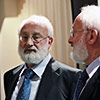Farewell To Egypt
 We have to go to a great deal of trouble in order to eventually reach “the King of Egypt died.” And afterward, “many days” begin in which we have to carry out many acts in order to reveal the correct demand within us. If we simply “scream from the lack of will to work,” that is not called “sighing from the work.”
We have to go to a great deal of trouble in order to eventually reach “the King of Egypt died.” And afterward, “many days” begin in which we have to carry out many acts in order to reveal the correct demand within us. If we simply “scream from the lack of will to work,” that is not called “sighing from the work.”
If we don’t receive pleasure from the work, we should gradually discern: “What does it mean “the King of Egypt died?” Why are we working and for whom? We gradually discern this, until we realize there is another king and we must exit Egypt in order to be the workers of the Creator, that is, to work for bestowal.
Yet, how can I do that, if here in Egypt everything’s so simple? I’m built in such a way that I feel pleasure the moment I carry out a certain act or make an effort in thinking. The reward arrives instantaneously, within my desire. Although initially, I seemed to long for bestowal, it was with the intent of “in order to receive.” I bestow, but that is how I receive pleasure,when I identify with my egoistic desire.
However, when the King of Egypt dies, it’s great help from Above, enabling us to detach from him. Indeed, he is now dead; I am rid of him. I didn’t want that, but he has left me. My ego has detached from him.
And I don’t know what to do; I have no one to work for any more. I cry and am still. I always enjoyed him so much, and now I am left with no pleasure in life. How will I find pleasure? In what desire, thought, or intent will I be able to feel it? I begin searching.
I used to work, bestowing in order to receive, yet now I will have to look for something else, and inevitably, through beatings, I will attain bestowal in order to bestow. I think to myself: If I don’t have the vessels in which I may find pleasure, I might be able to derive pleasure from someone else.
I look at someone else: He has pleasure, whereas I have no vitality. That is why I envy him and want to join him, in order to enjoy his pleasure. Perhaps that way, at least I’ll receive some satisfaction. That is how we begin to view our surroundings. I can’t enjoy by myself any more when I work within my “Egypt” as before.
However, if I bestow unto the environment and cause them pleasure, I’ll be able to join them and enjoy along with them; even though I join with the intent of receiving something in that manner, it still is called bestowing unto the environment. That is already called Lo Lishma (not for Her name). I bestow unto them and want for them to have goodness since I’m going to identify with them and join them, so that I will find goodness within them. That’s already an advanced stage.
There are different stages of drawing near exiting Egypt. Some already realize they act in order to benefit egoism and later reach Lishma, and there are others who don’t realize it in the meantime and only act in search of pleasure. Yet, no matter what, we’re advancing.
I already have the direction: I understand that I must join the group that is exiting Egypt. Indeed, I don’t receive pleasure from the simple life. Yet, if I join them, then there, within them, in our unity, I’ll find the pleasure and reveal my unique spiritual life. That’s already a step toward salvation: There’s a purpose in detaching from egoism. After all, Egypt is already dead and that is enough. If a person feels he must bestow unto the group and reveal the collective force in it called the Creator, if he wants to be included in it so that he will also receive something, that is already called Lo Lishma (an egoistic longing for spirituality).
There are various forms and levels in each one, at different times, but it already gives the direction until we conclude the struggle, the ten beatings, which help a person detach from Egypt for good and feel the life in Egypt as darkness.
The last beating is the killing of the firstborn, which shows us that nothing will stem from this situation for us, nothing will “be born” of it. And then it’s already totally clear to a person that this state can’t bear any result. When each firstborn in Egypt dies, then he agrees to escape.
All those states the Torah tells about take place in our will to receive. Beating after beating: Either Pharoah prevails, or the Creator prevails and “Moses” sees how all this happens within him and what the values are that he gives the will to receive and the will to bestow. That is until he sees the darkness in his situation, and remains with no choice other than escaping through this darkness to the will to bestow, only to see some sign of Light ahead. And this is how he escapes from Egypt. That’s what should happen in a person who’s prepared to join the society, even if he arrives in order to find livelihood in it and egoistic fulfillment: That is already called Lo Lishma
[68776]
From the 1st part of the Daily Kabbalah Lesson 2/5/12, Shamati #159
Related Material:
When Will We Finally Exit Egypt?
The Front Brakes
Spiritual Assembly Line









